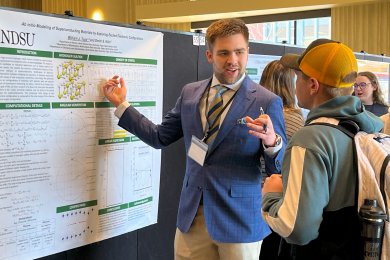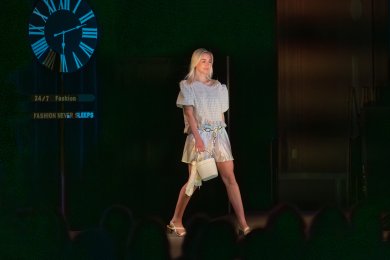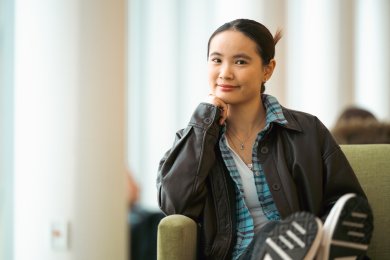Two NDSU faculty members are receiving a combined $1.3 million from the National Science Foundation to boost their respective research programs.
Peter Bergholz, assistant professor of veterinary and microbiological sciences, and Wei Jin, assistant professor of computer science, each are receiving five-year Faculty Early Career Development awards from the National Science Foundation.
The awards also will provide research opportunities for students.
Mapping the genome of bacteria
Bergholz studies bacteria we can’t see, but that can make us sick. Specifically, he studies how bacteria adapt to environmental changes. Bergholz is receiving up to $810,513 to aid his research into understanding microbes such as E. coli.
Determining how bacteria survive, thrive and adapt requires looking at the genome, or total collection of genes in an organism. “Genome sequences could tell us about every capability that an organism has, but the science is too young for that predictive power,” said Bergholz. “To make these kind of predictions, we have to know how genome characteristics relate to traits like survival in harsh conditions, or disease-causing behaviors.”
Bergholz’s research will help predict how the biodiversity of bacteria is generated and maintained. His team plans to sequence the genomes of 1,200 bacteria and look for associations between changes in the genome and changes in the soil environment.
Bergholz and his research team will conduct soil sampling along the Buffalo River watershed in northwestern Minnesota, with potential additional samples from New York state.
More than a dozen undergraduate and graduate students, as well as a postdoctoral scholar, will be engaged in the five-year study. Bergholz also will develop units that can be used in teaching biology and microbiology classes across the U.S. The project includes developing computer software to realistically simulate how bacteria evolve in natural environments such as agricultural landscapes. An online workshop in microbial genomics will be developed for high school and community college students in cooperation with North Dakota tribal colleges.
“Our research takes an integrated approach in which we combine laboratory and field studies to gain greater insight about the development of biodiversity in bacterial populations struggling to survive in nature,” said Bergholz. “The research will advance our power to predict how bacteria evolve. That has implications for how new biological capabilities arise in nature, including the emergence of new infectious diseases.”
The research is funded by Award No. 1453397 from the National Science Foundation.
Bergholz earned a doctorate in microbiology and molecular genetics from Michigan State University. He served as a research associate in food science and as a research associate and postdoctoral associate in crop and soil sciences at Cornell University.
Finding connections in big data
Jin will receive up to $498,433 to conduct research on developing smarter, more efficient methods to search for connections across documents in a large-scale setting. The final research generated by this project potentially could impact areas such as biomedical and health care applications, homeland security and aviation safety.
Current online search methods may result in discovery of information limited to each individual document, without exploring knowledge across documents, according to Jin. Textual information is growing at astounding rates, creating a challenge for analysts trying to discover valuable information that is buried across documents.
“The goal of my research is to explore automated solutions for sifting through these extensive document collections to detect interesting links and hidden information that connect facts, propositions or hypotheses,” said Jin.
Existing search paradigms excel at keyword matching and document ranking, but lag in handling some emerging information discovery needs, such as relationship queries. Jin’s research will explore implicit connections between concepts across documents and work to integrate information from correlative documents into one relevant and meaningful answer. Information analysts currently perform such tasks with limited assistance from Web search engines or domain-specific search systems, said Jin.
Through her research, Jin seeks to develop algorithms and tools that find the individual links of information that are not always obvious, yet form a chain which winds through mountains of data. The techniques also will attempt to integrate domain knowledge and relevant information from Wikipedia to complement or enhance existing information in text collections.
Through the research project, four graduate students will participate in education and training opportunities to prepare students in information analysis and discovery. Jin also will develop a series of data mining courses to introduce students to the frontiers of text and web mining research.
The research is funded by Award No. 1452898 from the National Science Foundation.
Jin earned a doctorate and master’s degree in computer science and engineering from State University of New York, Buffalo.
Since 1996, a total of 20 NDSU faculty members have received more than $10 million in National Science Foundation CAREER awards to conduct research in biology, biochemistry, chemistry, civil and electrical engineering, computer science, pharmaceutical sciences, plant sciences, coatings and polymeric materials, and veterinary and microbiological sciences.
Awardees currently at NDSU include faculty members Gregory Cook, Stuart Haring, Seth Rasmussen, Wenfang Sun, Sivaguru Jayaraman and Uwe Burghaus in chemistry and biochemistry; Sanku Mallik in pharmaceutical sciences; Magdy Abdelrahman, Xuefeng Chu, Kalpana Katti and Eakalak Khan in civil engineering; Kendra Greenlee in biological sciences; Hyunsook Do and Jin in computer science; Robert Brueggeman in plant sciences; and Bergholz in veterinary and microbiological sciences.
The National Science Foundation CAREER program recognizes and supports the early career-development activities of scholars who are likely to become the academic leaders of the 21st century. Recipients are chosen on the basis of creative career development plans that integrate research and education within the context of their university’s mission.
As a student-focused, land-grant, research university, we serve our citizens.



